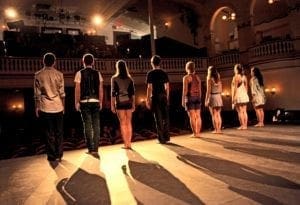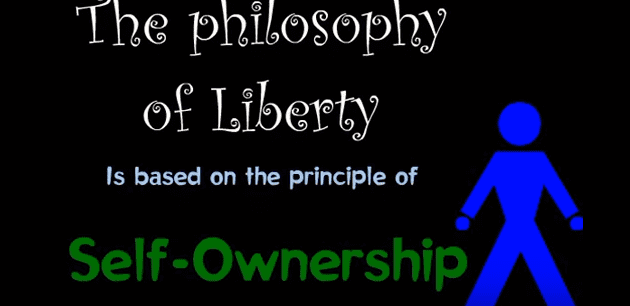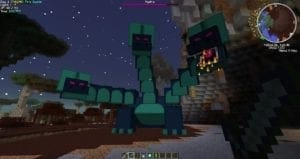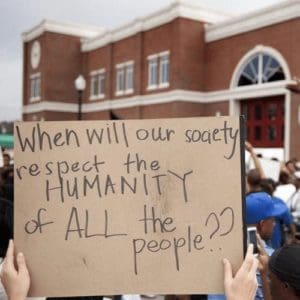Do You Think for Yourself?
This article was featured in our weekly newsletter, the Liberator Online. To receive it in your inbox, sign up here.
Me: What time did you wake up this morning?
The Young Statesman (13): 5:30
Me: People are going to be interested in knowing what it is that causes a thirteen-year-old to wake at 5:30 in the morning. Can you tell me about that?
YS: If I get up that early I can go to the gym and I can practice the organ. Those are two things I want to do every day and we do that every day. It’s done and I don’t have to worry about it. When I wake up early I can get that done early.
Me: You didn’t just wake yourself up, did you?
 YS:
YS: I woke The Baby Anarchist (8).
Me: How did you do that?
YS: I tuned on the light and woke him and gave him his clothes. While he brushed his teeth I made his bed. Then I went to my room, made my bed, tidied up, put away my laundry, brushed my teeth, and went downstairs. I let the dog out, I fed her, I filled up the water bottles for the gym, I got the breakfast cooler together, and we went to the gym.
Me: Did your brother need help with his shoes?
YS: Yeah. The shoe laces aren’t that good so I helped him.
Me: Why do you help your brother?
YS: One day I’m going to want his help. I’d might as well be nice to him.
Me: Did I tell you to do these things?
YS: No. You said you were going to the gym at 6 in the morning and if I got up early I could join you. Then you asked BA if he wanted to come so now all of us go.
Me: You’re a pretty independent kid, aren’t you?
YS: I don’t like to be told what to do.
Me: If I started pestering you to do things, what would be your reaction?
YS: I’d wonder if you’d been hit in the head.
Me: If I were insisting that you do these things would you be as willing as you are?
YS: Nope.
Me: Why not?
YS: Because when I’m being told to do things that puts me in a passive frame of mind. And it makes me not like you if you’re bossing me around.
Me: Tell me about being passive.
YS: If I try to take the initiative, I’m going to end up butting up against you. I’m living off of you and what you’re telling me to do. I stop thinking.
Me: At that point you’re just being directed.
YS: I stop thinking. I’m just in brainless mode. I’m like a dog.
Me: How long can you stand to be in that mode?
YS: Not very long. If you’re in that mode for very long, you rebel.
Me: So you act rebelliously?
YS: Yes. In response to not being allowed to think for yourself you make stupid decisions. You don’t even think before you act.
Me: So your actions aren’t so much your own decisions as they are reactions against authority. I don’t think that’s just what adolescents do. Anyone who is being dominated and doesn’t think it’s legitimate is going to do that.
YS: You’ve taught me to think. Not to obey. You don’t tell me what to do. You give advice. I can take it or not.
Me: Would there be a problem if you didn’t take my advice?
YS: No.
Me: You’d just have a different experience. I notice that you take my advice more often than not. Why?
YS: Because when I haven’t taken your advice I’ve gotten hurt. Remember when you told me not to run in flip flops and I didn’t listen and I scraped my face across the road?
Me: That was so awful.
YS: I was trying to take something back to a neighbor. It really hurt. I’ve never run in flip flops since. Do you remember when you told me not to shriek and cry about everything because you wouldn’t know when I was really hurt? And then when we were at the swamp and I broke my arm and I was screaming and crying and you didn’t come because I screamed and cried at everything. That was a learning experience. And when dad told me not to run the chisel towards my hand and I did it anyway and we ended up in the ER for five hours. Or when he told me not to shove sharp things and I was in the ER again. I’m learning. Slowly. And painfully. But if you had stopped me, I wouldn’t have learned to listen.
Me: We would have stopped you from getting hurt if we could have. Do you think the injuries were worth it?
YS: I do.
 Thou shalt not kill. Thou shalt not steal. Or as Libertarians like to say: Do not encroach upon the person or property of another. Simple, no? These rights don’t require you to Do anything. Only to refrain. A negative right essentially protects you from the encroachment of another person, a group, and the State. The negative right tells you that you can expect not to be subject to violence or coercion.
Negative rights are based on the idea of ownership. You own yourself and you own your property. No one has the right to infringe upon your life or your liberty or your property because they properly belong to you. For a negative right to be violated, one person, group, or State must encroach upon another. (Thou shalt not kill apparently doesn’t apply to tornadoes or earthquakes so if you’re killed by a tornado we don’t say that your rights have been violated.)
If you’ve ever heard someone argue that all people have the right to healthcare, education, food, shelter, or clothing they were making an argument for Positive rights. Positive rights make everyone responsible for providing one another with goods, services, and resources. Positive rights negate the principle of ownership. Every single argument for Positive rights without exception, no matter how kindly intended or reasonable, is an attack on self ownership and property.
Positive rights are based on the principle that we do Not own ourselves nor do we own our property. Therefore access to the property and person of another without their consent–theft and servitude–is fair and reasonable.
Positive rights require that you Do something. This is a violation of the principle of self-ownership. If I own myself, I am not required to Do anything at the behest of another. A Positive right guarantees the encroachment of another person, a group, and the State against your person and property. You will be subject to violence and coercion if you violate the right of another to your labor and property.
Constitutionally, the preservation of Negative rights is the purview of the State. Negative rights are ancient and history has shown that despots violate them first by claiming the ‘general welfare’ or ‘common good’ is being served and after establishing that the people will tolerate their breach they will do away with them in all but name.
Thou shalt not kill. Thou shalt not steal. Or as Libertarians like to say: Do not encroach upon the person or property of another. Simple, no? These rights don’t require you to Do anything. Only to refrain. A negative right essentially protects you from the encroachment of another person, a group, and the State. The negative right tells you that you can expect not to be subject to violence or coercion.
Negative rights are based on the idea of ownership. You own yourself and you own your property. No one has the right to infringe upon your life or your liberty or your property because they properly belong to you. For a negative right to be violated, one person, group, or State must encroach upon another. (Thou shalt not kill apparently doesn’t apply to tornadoes or earthquakes so if you’re killed by a tornado we don’t say that your rights have been violated.)
If you’ve ever heard someone argue that all people have the right to healthcare, education, food, shelter, or clothing they were making an argument for Positive rights. Positive rights make everyone responsible for providing one another with goods, services, and resources. Positive rights negate the principle of ownership. Every single argument for Positive rights without exception, no matter how kindly intended or reasonable, is an attack on self ownership and property.
Positive rights are based on the principle that we do Not own ourselves nor do we own our property. Therefore access to the property and person of another without their consent–theft and servitude–is fair and reasonable.
Positive rights require that you Do something. This is a violation of the principle of self-ownership. If I own myself, I am not required to Do anything at the behest of another. A Positive right guarantees the encroachment of another person, a group, and the State against your person and property. You will be subject to violence and coercion if you violate the right of another to your labor and property.
Constitutionally, the preservation of Negative rights is the purview of the State. Negative rights are ancient and history has shown that despots violate them first by claiming the ‘general welfare’ or ‘common good’ is being served and after establishing that the people will tolerate their breach they will do away with them in all but name.













































